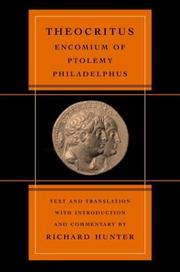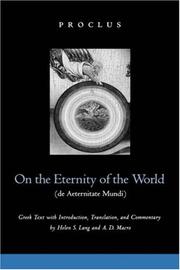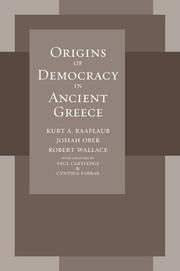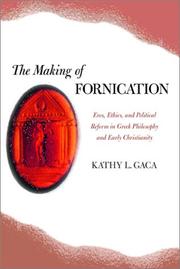| Listing 1 - 10 of 15 | << page >> |
Sort by
|
Book
ISBN: 9789058267252 Year: 2010 Publisher: Leuven Davidsfonds
Abstract | Keywords | Export | Availability | Bookmark
 Loading...
Loading...Choose an application
- Reference Manager
- EndNote
- RefWorks (Direct export to RefWorks)
Ancient history --- Romeinse oudheid --- Griekse oudheid --- Academic collection --- C3 --- geschiedenis --- oudheid (x) --- 923 --- oudheid --- Griekenland --- Romeinse rijk --- geschiedenis: klassieke oudheid --- grieken (ler) --- romeinen (ler) --- Kunst en cultuur --- geschiedenis - klassieke oudheid --- #GGSB: Geschiedenis (oudheid) --- Greece --- Civilization --- History --- Rome --- Ancient Greek [culture or style] --- Greco-Roman --- Roman [ancient Italian culture or period] --- Geschiedenis (oudheid)
Book
ISBN: 0520957024 9780520957022 0520276817 9780520276819 9780520276819 0520344588 Year: 2013 Publisher: Berkeley University of California Press
Abstract | Keywords | Export | Availability | Bookmark
 Loading...
Loading...Choose an application
- Reference Manager
- EndNote
- RefWorks (Direct export to RefWorks)
The "Second Sophistic" traditionally refers to a period at the height of the Roman Empire's power that witnessed a flourishing of Greek rhetoric and oratory, and since the 19th century it has often been viewed as a defense of Hellenic civilization against the domination of Rome. This book proposes a very different model. Covering popular fiction, poetry and Greco-Jewish material, it argues for a rich, dynamic, and diverse culture, which cannot be reduced to a simple model of continuity. Shining new light on a series of playful, imaginative texts that are left out of the traditional accounts of Greek literature, Whitmarsh models a more adventurous, exploratory approach to later Greek culture. Beyond the Second Sophistic offers not only a new way of looking at Greek literature from 300 BCE onwards, but also a challenge to the Eurocentric, aristocratic constructions placed on the Greek heritage. Accessible and lively, it will appeal to students and scholars of Greek literature and culture, Hellenistic Judaism, world literature, and cultural theory.
Greek literature --- Balkan literature --- Byzantine literature --- Classical literature --- Classical philology --- Greek philology --- History and criticism. --- Greek literature -- Rome -- History and criticism.. --- Greek literature -- History and criticism. --- ancient literature. --- aristocratic constructions. --- classics. --- different model. --- diverse culture. --- engaging. --- exploratory approach. --- greco-jewish material. --- greek culture. --- greek heritage. --- greek literature. --- greek oratory. --- greek rhetoric. --- hellenic civilization. --- hellenistic judaism. --- historical. --- history. --- literary. --- roman empire. --- rome. --- second sophistic.
Book
ISBN: 0520967917 9780520967915 9780520295001 Year: 2017 Publisher: Oakland, California
Abstract | Keywords | Export | Availability | Bookmark
 Loading...
Loading...Choose an application
- Reference Manager
- EndNote
- RefWorks (Direct export to RefWorks)
Seers featured prominently in ancient Greek culture, but they rarely appear in archaic and classical colonial discourse. Margaret Foster exposes the ideological motivations behind this discrepancy and reveals how colonial discourse privileged the city's founder and his dependence on Delphi, the colonial oracle par excellence, at the expense of the independent seer. Investigating a sequence of literary texts, Foster explores the tactics the Greeks devised both to leverage and suppress the extraordinary cultural capital of seers. The first cultural history of the seer, The Seer and the City illuminates the contests between religious and political powers in archaic and classical Greece.
Prophets --- Oracles, Greek. --- Religion and politics --- History. --- Hero --- Greece --- Colonies. --- ancient greece. --- ancient greek politics. --- ancient world. --- antiquity. --- archaic greece. --- archaic. --- classical greece. --- classical world. --- classical. --- colonial discourse. --- colonial. --- colonialism. --- culture. --- delphi. --- divination. --- greek culture. --- greek politics. --- hellenistic period. --- ideological. --- ideology. --- literary analysis. --- literary texts. --- oracle. --- politics. --- religion. --- religious studies. --- seercraft. --- seers.
Periodical
ISSN: 00173916 21593159 Year: 2009 Publisher: Durham (N.C.): Duke university press,
Abstract | Keywords | Export | Availability | Bookmark
 Loading...
Loading...Choose an application
- Reference Manager
- EndNote
- RefWorks (Direct export to RefWorks)
Classical antiquities
---
Byzantine antiquities
---
Antiquités gréco-romaines
---
Antiquités byzantines
---
Periodicals
---
Périodiques
---
Greece
---
Byzantine Empire
---
Grèce
---
Empire byzantin
---
Antiquities
---
History
---
Civilization
---
Antiquités
---
Histoire
---
Civilisation
---
#BIBC:tijdschradm

ISBN: 0520235606 1282356968 0520929373 9786612356964 1597345962 9780520929371 1417525665 9781417525669 9780520235601 Year: 2003 Volume: 39 Publisher: Berkeley University of California Press
Abstract | Keywords | Export | Availability | Bookmark
 Loading...
Loading...Choose an application
- Reference Manager
- EndNote
- RefWorks (Direct export to RefWorks)
Under Ptolemy II Philadelphus, who ruled Egypt in the middle of the third century B.C.E., Alexandria became the brilliant multicultural capital of the Greek world. Theocritus's poem in praise of Philadelphus-at once a Greek king and an Egyptian pharaoh-is the only extended poetic tribute to this extraordinary ruler that survives. Combining the Greek text, an English translation, a full line-by-line commentary, and extensive introductory studies of the poem's historical and literary context, this volume also offers a wide-ranging and far-reaching consideration of the workings and representation of poetic patronage in the Ptolemaic age. In particular, the book explores the subtle and complex links among Theocritus's poem, modes of praise drawn from both Greek and Egyptian traditions, and the subsequent flowering of Latin poetry in the Augustan age. As the first detailed account of this important poem to show how Theocritus might have drawn on the pharaonic traditions of Egypt as well as earlier Greek poetry, this book affords unique insight into how praise poetry for Ptolemy and his wife may have helped to negotiate the adaptation of Greek culture that changed conditions of the new Hellenistic world. Invaluable for its clear translation and its commentary on genre, dialect, diction, and historical reference in relation to Theocritus's Encomium, the book is also significant for what it reveals about the poem's cultural and social contexts and about Theocritus' devices for addressing his several readerships. COVER IMAGE: The image on the front cover of this book is incorrectly identified on the jacket flap. The correct caption is: Gold Oktadrachm depicting Ptolemy II and Arsinoe (mid-third century BCE; by permission of the Museum of Fine Arts, Boston).
Ptolemy II Philadelphus, King of Egypt --- Theocritus --- Ptolemy --- Ptolemaeus --- Ptolemy II Philadelphus --- Poetry --- LITERARY CRITICISM / Ancient & Classical. --- alexandria. --- ancient egypt. --- ancient greece. --- aristophanes. --- arsinoe ii. --- art. --- augustan poetry. --- classical studies. --- clouds. --- egypt. --- encomium. --- genre studies. --- greek culture. --- greek poetry. --- greek world. --- hellenism. --- hellenistic poetry. --- hellenistic world. --- heracles. --- homeric hymn. --- hymn. --- king. --- latin poetry. --- literary criticism. --- monarchy. --- mythology. --- patronage. --- patrons. --- pharaoh. --- pharaonic traditions. --- philadelphus. --- pithom stele. --- poetic meter. --- poetic tribute. --- poetry. --- poets. --- praise. --- ptolemaic dynasty. --- ptolemy ii. --- reign. --- ruler. --- theocritus. --- third century. --- zeus.
Book
ISBN: 0520953932 9780520953932 1299605516 9781299605510 9780520272507 0520272501 Year: 2012 Publisher: Berkeley
Abstract | Keywords | Export | Availability | Bookmark
 Loading...
Loading...Choose an application
- Reference Manager
- EndNote
- RefWorks (Direct export to RefWorks)
In the ancient Greece of Pericles and Plato, the polis, or city-state, reigned supreme, but by the time of Alexander, nearly half of the mainland Greek city-states had surrendered part of their autonomy to join the larger political entities called koina. In the first book in fifty years to tackle the rise of these so-called Greek federal states, Emily Mackil charts a complex, fascinating map of how shared religious practices and long-standing economic interactions facilitated political cooperation and the emergence of a new kind of state. Mackil provides a detailed historical narrative spanning five centuries to contextualize her analyses, which focus on the three best-attested areas of mainland Greece-Boiotia, Achaia, and Aitolia. The analysis is supported by a dossier of Greek inscriptions, each text accompanied by an English translation and commentary.
Religion and state --- City-states --- State and religion --- State, The --- History. --- Religious aspects --- Greece --- Politics and government --- ancient greece. --- ancient history. --- biographical. --- book club reads. --- christianity. --- discussion books. --- easy to read. --- engaging. --- greek city states. --- greek culture. --- greek economics. --- greek history. --- greek philosophers. --- greek politics. --- historical. --- history and politics. --- history of warfare. --- informative books. --- king alexander the great. --- koina history. --- leisure reads. --- page turner. --- political process. --- political science. --- practical politics. --- religion and economics. --- religion and politics. --- religious history. --- religious practices. --- rule of alexander.

ISBN: 0520225546 9780520225541 0520925769 1281752428 9786611752422 1429440090 052093217X 1433700018 Year: 2001 Publisher: Berkeley: University of California press,
Abstract | Keywords | Export | Availability | Bookmark
 Loading...
Loading...Choose an application
- Reference Manager
- EndNote
- RefWorks (Direct export to RefWorks)
In the fifth century A.D., Proclus served as head of the Academy in Athens that had been founded 900 years earlier by Plato. Proclus was the last great systematizer of Greek philosophy, and his work exerted a powerful influence in late antiquity, in the Arab world, and in the Renaissance. His treatise On the Eternity of the World formed the basis for virtually all later arguments for the eternity of the world and for the existence of God; consequently, it lies at the heart of neoplatonic philosophy and the controversy between pagans and Christians at the end of antiquity. Proclus’s eighteen Arguments were quoted within John Philoponus’ polemic against him, written in the sixth century; but the opening pages of the sole extant manuscript, which contained the first Argument, have been lost. In this book, Helen Lang and A.D. Macro present the seventeen Arguments preserved by Philoponus and translate them as an independent work. The first Argument, which survives in Arabic, is also included and makes this the only complete edition of On the Eternity of the World since antiquity. This bilingual edition comprises the seventeen Arguments (II-XVIII) in Greek and English, along with an introduction, synopses, and detailed notes which help readers with or without Greek to understand them philosophically and historically. Two appendices complete the volume: the Arabic text of the first Argument, also with English translation and notes, and the first modern edition of an important Latin translation from the Renaissance. In a valuable introduction, Lang and Macro examine the complex history of these Arguments. Together with its excellent annotations, and English and Greek texts en face, the publication of Proclus’s On the Eternity of the Worldmakes available an influential work by a major figure in the history of late Greek philosophy.
Cosmology --- Eternity --- Infinite --- Future life --- Cosmology - Early works to 1800 --- Eternity - Early works to 1800 --- Democracy --- History --- Greece --- Athens (Greece) --- Politics and government --- Politics and government. --- academic. --- ancient greece. --- ancient historian. --- ancient history. --- ancient world. --- athenian democracy. --- athens. --- cleisthenes. --- cultural history. --- cultural studies. --- easy to understand. --- ephialtes. --- greek culture. --- greek democracy. --- greek government. --- greek history. --- philosophical. --- political philosophy. --- political science. --- political scientist. --- political. --- politics. --- scholarly. --- social change. --- social history. --- social studies. --- solon.
Book
ISBN: 9780520253360 0520253361 0520290844 9786612463204 1282463209 0520943635 9780520943636 9781282463202 6612463201 Year: 2010 Publisher: Berkeley : University of California Press,
Abstract | Keywords | Export | Availability | Bookmark
 Loading...
Loading...Choose an application
- Reference Manager
- EndNote
- RefWorks (Direct export to RefWorks)
This landmark contribution to ongoing debates about perceptions of the Jews in antiquity examines the attitudes of Greek writers of the Hellenistic period toward the Jewish people. Among the leading Greek intellectuals who devoted special attention to the Jews were Theophrastus (the successor of Aristotle), Hecataeus of Abdera (the father of "scientific" ethnography), and Apollonius Molon (probably the greatest rhetorician of the Hellenistic world). Bezalel Bar-Kochva examines the references of these writers and others to the Jews in light of their literary output and personal background; their religious, social, and political views; their literary and stylistic methods; ethnographic stereotypes current at the time; and more.
Greek literature, Hellenistic --- Jews in literature. --- History and criticism. --- Juifs dans la littérature --- Littérature grecque hellénistique --- Histoire et critique --- Jews in literature --- History and criticism --- apollonius molon. --- bezalel bar kochva. --- discussion books. --- greek culture. --- greek history. --- greek intellectuals. --- greek literature. --- greek writers. --- hecataeus of abdera. --- hellenistic period. --- historical jews. --- history buffs. --- jewish culture. --- jewish people. --- jewish representation. --- jews in literature. --- literary references. --- literary style. --- literary. --- perceptions of jews. --- political views. --- religious backgrounds. --- religious history. --- rhetoric. --- scientific ethnography. --- social connections. --- stereotypes. --- theophrastus.

ISBN: 0520925769 1281752428 9786611752422 1429440090 052093217X 1433700018 9780520932173 9781281752420 9781429440097 9780520245624 0520245628 Year: 2007 Publisher: Berkeley University of California Press
Abstract | Keywords | Export | Availability | Bookmark
 Loading...
Loading...Choose an application
- Reference Manager
- EndNote
- RefWorks (Direct export to RefWorks)
This book presents a state-of-the-art debate about the origins of Athenian democracy by five eminent scholars. The result is a stimulating, critical exploration and interpretation of the extant evidence on this intriguing and important topic. The authors address such questions as: Why was democracy first realized in ancient Greece? Was democracy "invented" or did it evolve over a long period of time? What were the conditions for democracy, the social and political foundations that made this development possible? And what factors turned the possibility of democracy into necessity and reality? The authors first examine the conditions in early Greek society that encouraged equality and "people's power." They then scrutinize, in their social and political contexts, three crucial points in the evolution of democracy: the reforms connected with the names of Solon, Cleisthenes, and Ephialtes in the early and late sixth and mid-fifth century. Finally, an ancient historian and a political scientist review the arguments presented in the previous chapters and add their own perspectives, asking what lessons we can draw today from the ancient democratic experience. Designed for a general readership as well as students and scholars, the book intends to provoke discussion by presenting side by side the evidence and arguments that support various explanations of the origins of democracy, thus enabling readers to join in the debate and draw their own conclusions.
Democracy --- Self-government --- Political science --- Equality --- Representative government and representation --- Republics --- History --- Athens (Greece) --- Greece --- Politics and government. --- Politics and government --- Democracy -- Greece -- History -- To 1500.. --- Democracy -- Greece -- Athens -- History -- To 1500.. --- Greece -- Politics and government -- To 146 B.C.. --- Athens (Greece) -- Politics and government. --- academic. --- ancient greece. --- ancient historian. --- ancient history. --- ancient world. --- athenian democracy. --- athens. --- cleisthenes. --- cultural history. --- cultural studies. --- easy to understand. --- ephialtes. --- greek culture. --- greek democracy. --- greek government. --- greek history. --- philosophical. --- political philosophy. --- political science. --- political scientist. --- political. --- politics. --- scholarly. --- social change. --- social history. --- social studies. --- solon.

ISBN: 9786612356988 0520929462 1282356984 978058545633X 1597347280 9780520929463 058545633X 9780585456331 9781282356986 0520235991 9780520235991 9781597347280 6612356987 Year: 2003 Publisher: Berkeley University of California Press
Abstract | Keywords | Export | Availability | Bookmark
 Loading...
Loading...Choose an application
- Reference Manager
- EndNote
- RefWorks (Direct export to RefWorks)
This provocative work provides a radical reassessment of the emergence and nature of Christian sexual morality, the dominant moral paradigm in Western society since late antiquity. While many scholars, including Michel Foucault, have found the basis of early Christian sexual restrictions in Greek ethics and political philosophy, Kathy L. Gaca demonstrates on compelling new grounds that it is misguided to regard Greek ethics and political theory-with their proposed reforms of eroticism, the family, and civic order-as the foundation of Christian sexual austerity. Rather, in this thoroughly informed and wide-ranging study, Gaca shows that early Christian goals to eradicate fornication were derived from the sexual rules and poetic norms of the Septuagint, or Greek Bible, and that early Christian writers adapted these rules and norms in ways that reveal fascinating insights into the distinctive and largely non-philosophical character of Christian sexual morality. Writing with an authoritative command of both Greek philosophy and early Christian writings, Gaca investigates Plato, the Stoics, the Pythagoreans, Philo of Alexandria, the apostle Paul, and the patristic Christians Clement of Alexandria, Tatian, and Epiphanes, freshly elucidating their ideas on sexual reform with precision, depth, and originality. Early Christian writers, she demonstrates, transformed all that they borrowed from Greek ethics and political philosophy to launch innovative programs against fornication that were inimical to Greek cultural mores, popular and philosophical alike. The Septuagint's mandate to worship the Lord alone among all gods led to a Christian program to revolutionize Gentile sexual practices, only for early Christians to find this virtually impossible to carry out without going to extremes of sexual renunciation. Knowledgeable and wide-ranging, this work of intellectual history and ethics cogently demonstrates why early Christian sexual restrictions took such repressive ascetic forms, and casts sobering light on what Christian sexual morality has meant for religious pluralism in Western culture, especially among women as its bearers.
Sexual ethics --- Philosophy, Ancient. --- Sex --- Gender (Sex) --- Human beings --- Human sexuality --- Sex (Gender) --- Sexual behavior --- Sexual practices --- Sexuality --- Sexology --- Ancient philosophy --- Greek philosophy --- Philosophy, Greek --- Philosophy, Roman --- Roman philosophy --- History. --- Religious aspects --- Christianity --- History of doctrines. --- Philosophy, Ancient --- Influence. --- apostle paul. --- asceticism. --- bible. --- christianity. --- christians clement. --- church history. --- desire. --- early church. --- epiphanes. --- erotics. --- ethics. --- feminist theory. --- fornication. --- gender. --- greek bible. --- greek culture. --- innocence. --- moral paradigm. --- passion. --- phill of alexandria. --- philo of alexandria. --- philosophy. --- plato. --- political philosophy. --- purity. --- religion. --- religious pluralism. --- septuagint. --- sexual austerity. --- sexual morality. --- sexual reform. --- sexual renunciation. --- sexual restrictions. --- sexuality. --- sin. --- stoics. --- tatian. --- theology. --- women and religion. --- women.
| Listing 1 - 10 of 15 | << page >> |
Sort by
|

 Search
Search Feedback
Feedback About UniCat
About UniCat  Help
Help News
News